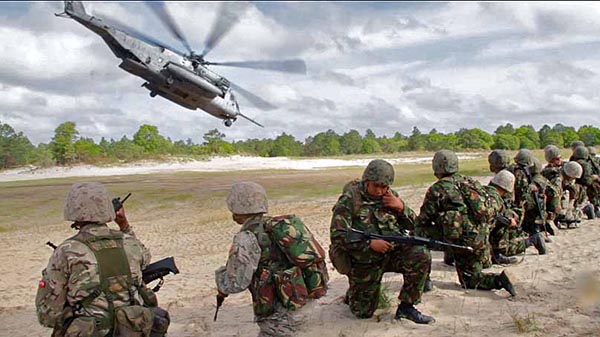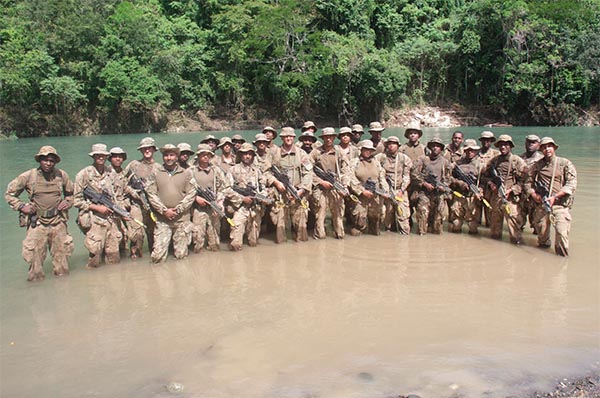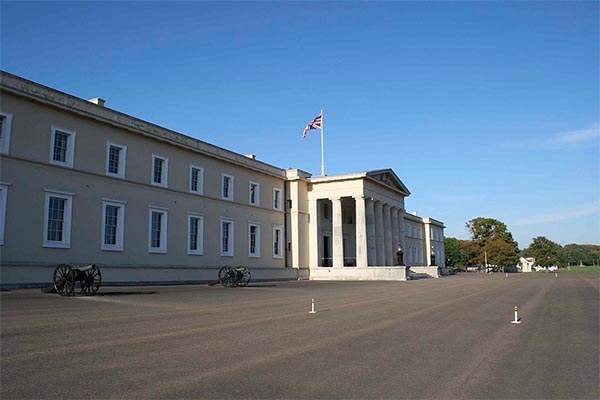Gain Skills, Challenge Yourself, Lead!
General
The Regiment offers extensive training in many areas and not all of this training is strictly military. Training opportunities fall into two broad categories: Leadership and Command Training and Job Specific Training. Certain training in Bermuda is limited due to space, resources and logistics, however, there are extensive opportunities for training overseas for eligible candidates and as demanded by the needs of the Regiment.

Overseas Training Locations
The Royal Bermuda Regiment has travelled and trained all over the world and today the opportunities are greater than ever before. Amongst regular training locations such as the US, Canada, Jamaica and the UK, Regiment personnel have trained in Cyprus, St Lucia, Norway, Dominica, Morocco, Kenya, Jordan, Barbados, Belize, Germany, Antigua and Gibraltar to name a few. Operational tours have also taken place in Sierra Leone, the Cayman Islands, Grenada and the Turks and Caicos Islands.
Attachments
As a Regiment we are fortunate to have well-established affiliations with our sister regiments. Limited slots are available for soldiers for attachments to other units. These may run for two weeks or more. In 2014 the Regiment was able to attach 3 soldiers to the Welsh Guard for Exercise Askari Thunder in Kenya. This exercise was 6 weeks long with 2 weeks of pre-deployment training in London. In 2016 another Regiment soldier was attached to 2nd Bn Royal Anglian Regiment for the six-week Exercise Askari Storm, also in Kenya.
Leadership and Command Training
Non-Commissioned Officer Training
The Junior Non-Commissioned Officer Cadre (the “JNCO Cadre” or just “Cadre”, pronounced “carder”) is a promotions course for promotion from Pte to LCpl and is open to all soldiers who have completed one year of service and have the recommendation of their Company Commander. This training requires additional drill nights and weekends and develops your leadership and command skills, broadens your military knowledge and strengthens teamwork. The tactics phase runs from February, building to an overseas camp in June. This is followed by the Method of Instruction (MOI) phase that is conducted until October. Successful students will receive their first stripe and pass out as a Lance Corporal in November. From there follows further instructor training.
Potential JNCO’s will then progress to the Methods of Instruction Cadre (MOI). On the MOI students will be taught how to teach. The rifle lesson is typically the lesson content but the theory can be applied to any lesson. The MOI also focuses on presentation skills generally as well as public speaking.
After completing the MOI Cadre JNCO’s will progress with job specific training. Once sufficient experience has been acquired a JNCO can be recommended for the Section Commander’s Battle Course at the Infantry Battle School, Brecon, Wales.
In order to be considered for promotion to Sergeant a Cpl may return to Brecon to complete the Platoon Sergeant’s Battle Course. Colour Sergeants will typically attend the Advanced All Arms Drill Course at Catterick in the UK before being promoted to Warrant Officer.
Officer Training
Soldiers who wish to be considered for officers selection must attend a selection weekend where potential candidates are assessed on leadership, critical thinking, military knowledge and presentation skills among other things. Candidates will have typically completed the JNCO Cadre, however, this is not a requirement for consideration. A group of senior officers will interview candidates and then make recommendations to the CO. Officer Cadets will then participate in a local training programme which prepares them for the Army Reserve Commissioning Course (ARCC) at the Royal Military Academy Sandhurst. On completion of the course the soldier will receive a Governor’s Commission.
Once sufficient experience has been gained a Lieutenant will attend the Platoon Commander’s Battle Course at the British Army Infantry Battle School at Brecon, Wales. Officers may then attend as a Senior Lieutenant or Junior Captain the Junior Officers Tactical Awareness Course (JOTAC) at the Land Warfare School in Warminster, UK. Before promotion to Major, Captains attend a staff course, typically the Primary Reserve Army Operations Course (PROAC) at the Canadian Army Command and Staff College in Kingston, Ontario. Once promoted to Major, officers may attend the Advance Command Staff Course (ACSC) at the UK Defence Academy.
Job Specific Training
Range Qualification. 
All Senior NCO’s and Officers are required to obtain an SA 80 (B) Range Qualification. This allows soldiers to conduct static ranges. There may also be the opportunity to complete the training to obtain the SA 80 (C) Qualification in the UK which allows soldiers to conduct field ranges where the firers are moving.
A Coy. Delivers the following training:
A Coy is trained in low-level infantry skills and standard Internal Security drills with an emphasis on Public Order including with the Bermuda Police Service.
The Regimental Police. Trained as BPS Special Constables and in search and arrest procedures.
B Coy. Delivers the following training:
B Coy has the lead in delivering the RBR's Humanitarian Aid and Disaster Relief capability as well as well as National Ceremonial Duties.
The unit also includes Guns and Assault Pioneers (GAP) who train on bridging, shoring and construction training. GAP are also trained to fire the ceremonial 25lb Guns.
The Band who provide music and theory training.
Logs Coy. Logistics Coy encompasses the following training:
Comms Unit.
Medic Section. First Aid, CPR, Infant CPR, IV and Burns, ECAT, EMT and other medical training in (with St John Ambulance and Bermuda Hospitals Board).
Motor Transport Section. Mechanical/Vehicle Repair (Marine and Automotive), vehicle operation and instruction – including the training and licensing for all classes of vehicles including buses. Advanced Driver Training (with BPS).
QM Coy Cooks Section. Culinary and food safety training.
QM Coy Stores. Inventory Management and Inflow Training.
Training Wing.
Delivers recruit training and all Command Leadership and Managment (CLM) training for the Regiment. This includes the Junior Non-Commissioned Officer cadre.
Coast Guard.
RBR Boat Troop undergo Coxswain, Pilot and Navigation courses, Oil Spill Recovery Training (with CCA and local Oil Companies) and Rummage, boarding and interdiction techniques (HM Customs and BPS), and Special Constable Training with the BPS.






